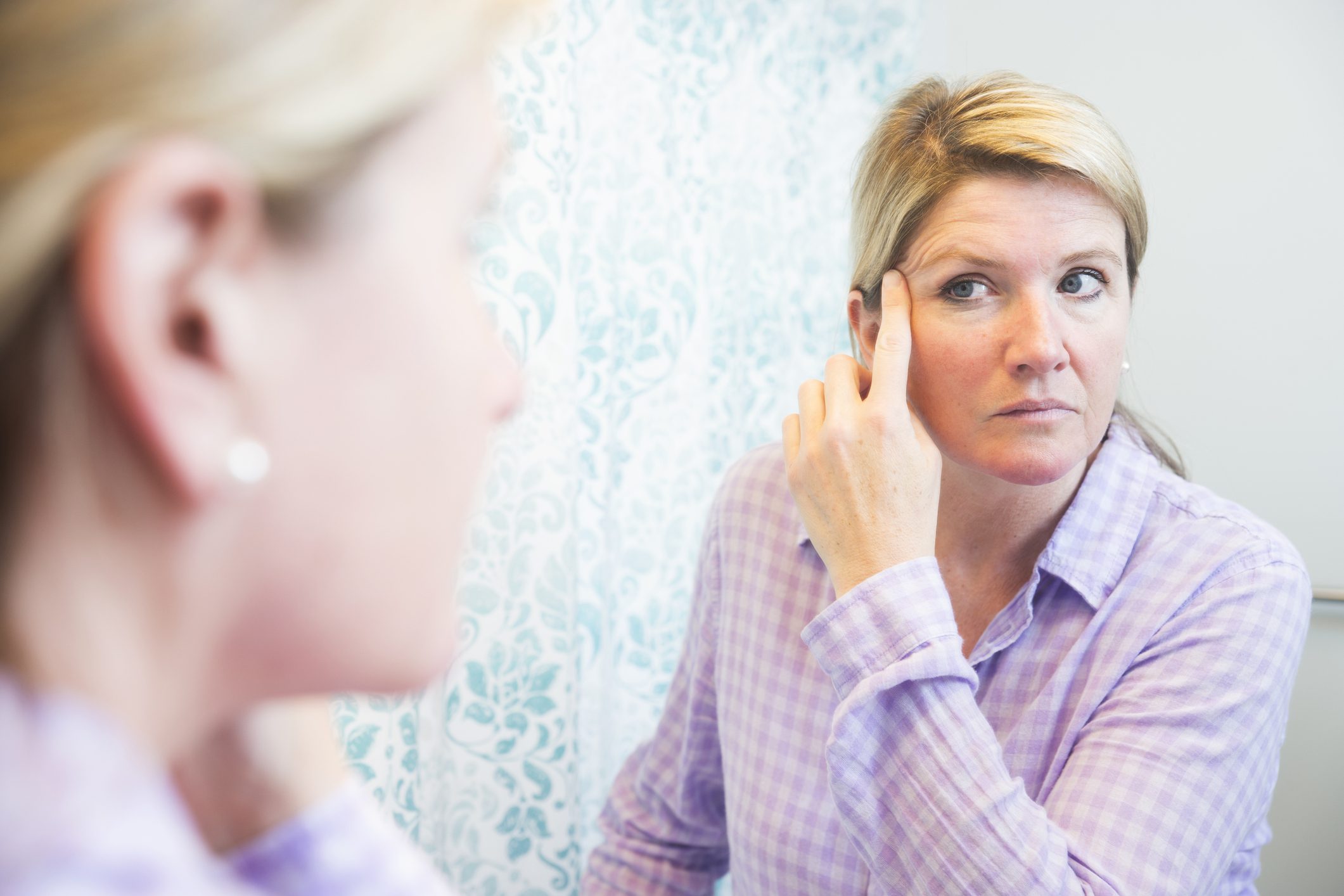If you find yourself grappling with mood swings, anxiety, and even depression during menopause, you’re not alone. Many women share these unpleasant experiences during this transition.
As you approach menopause, your body undergoes significant hormonal changes, primarily marked by a decline in estrogen and progesterone levels.
These hormones, which have played pivotal roles in your reproductive years, also profoundly impact mood regulation and overall mental well-being.1 Testosterone levels, often associated with libido and energy, can also fluctuate during this time, further influencing your mood and emotional state.2
The impact of these hormonal fluctuations on mood regulation can be profound. Estrogen, in particular, has a protective effect on your brain. This hormone can impact how your brain makes and uses mood-regulating neurotransmitters, including serotonin and dopamine.3 Both play crucial roles in regulating mood and emotional states. Serotonin supports mood stabilization, happiness, and well-being. Dopamine is associated with pleasure, reward, and motivation.
As estrogen levels drop, fluctuations in these neurotransmitters mean you might find yourself more susceptible to mood swings, irritability, and feelings of sadness or anxiety.4 Likewise, testosterone’s role in maintaining energy levels and a sense of well-being means that changes in its levels can further contribute to these emotional shifts.5
How Each Phase of Menopause Impacts Mental Health
Each phase of this transition presents its unique obstacles:
Perimenopause
This initial phase of menopause can feel like a rollercoaster of hormonal fluctuations, with varying estrogen and progesterone levels. Perimenopause is associated with dozens of symptoms, including irregular periods, hot flashes, sleep disturbances, and mood swings, all reflecting your body’s adjusting hormonal environment.6 It also brings about challenges in maintaining bone density and muscle mass due to these hormone declines.
Menopause
Menopause is the one-year anniversary of your last period. Everything before that is perimenopause, and everything moving forward is postmenopause. Around this time, estrogen and progesterone stabilize at low levels. Symptoms may also continue, including hot flashes, vaginal dryness, and an increased risk of cardiovascular disease.7 These changes affect your physical health and lead to mood fluctuations, impacting emotional and sexual well-being.
Postmenopause
In this final stage of the menopause transition, estrogen levels have settled to a low but steady state. Although some symptoms of menopause may start to diminish, the emotional landscape can remain complex, with ongoing mood shifts.8 Physically, it remains a challenge to preserve bone health, combat muscle loss, and mitigate the increased risk of chronic conditions like heart disease and type 2 diabetes, all of which can create stress that impacts mental health.
Common Mental Health Symptoms During Menopause
As your body adjusts to fluctuating hormone levels, many women find themselves facing a range of mental health symptoms.
Mood Swings and Irritability
One of the hallmark mental health symptoms of menopause is the experience of mood swings and increased irritability. This rollercoaster of emotions results from declining levels of estrogen and progesterone.9 You may find yourself more prone to sudden feelings of frustration, anger, or impatience, sometimes for no apparent reason.
Anxiety and Panic Attacks
Menopause can also see an uptick in feelings of anxiety, with some women experiencing panic attacks for the first time.10 These attacks involve a sudden onset of intense fear or discomfort that reaches a peak within minutes.
Symptoms of a panic attack include palpitations, sweating, trembling, shortness of breath, a feeling of choking, chest pain, nausea, dizziness, chills or heat sensations, numbness or tingling sensations, derealization (feelings of unreality) or depersonalization (being detached from oneself), fear of losing control or going crazy, and fear of dying.
The hormonal upheavals can contribute to heightened worry and fear, making once manageable situations feel overwhelming. This increase in anxiety can affect sleep, concentration, and overall quality of life.11
Depression and Feelings of Sadness
Many women experience depression or persistent feelings of sadness during menopause.12 Declining hormone levels coupled with potential stressors such as aging, health concerns, or life transitions can weigh heavily on your mental well-being. You’ll want to carefully distinguish between temporary blues and more severe depression, which requires professional support.
Brain Fog
Estrogen plays a key role in regulating neurotransmitter systems in the brain, including those responsible for mood, memory, and cognitive function.
Declining estrogen levels during menopause can directly affect these brain functions, leading to symptoms of brain fog. This term describes these feelings of confusion, forgetfulness, and lack of focus and mental clarity that can accompany menopause.13 These symptoms can be particularly problematic, affecting professional performance, daily tasks, and self-confidence.
Contributing Factors to Mental Health Challenges During Menopause
At the heart of these mental challenges are hormonal fluctuations, which not only redefine the body’s physical state but also instigate changes in brain chemistry. As estrogen levels decline, so does its management of mood-regulating neurotransmitters. This biochemical shift sets the stage for mood swings, anxiety, and depression, highlighting the critical role of hormones in mental health during menopause.
Besides the effects of biology, your thoughts and feelings during this transition also impact your mood. Stress from work, personal life, or health problems can lead to mental health issues.14 Worries about body image become more common, too, as changes during menopause can make people feel differently about how they look. Significant life changes, like children moving out or starting retirement, add extra challenges to this already tough time.
Social factors further color the menopausal experience, with the strength and quality of support systems playing a crucial role in navigating this period. Relationships, both personal and professional, can act as sources of support or stress, influencing mental-health outcomes. Shifts in your libido and mood fluctuations can take a toll on intimate relationships. Additionally, attitudes and misconceptions about menopause that you may encounter often exacerbate feelings of isolation or misunderstanding.
Together, these biological, psychological, and social factors paint a complex picture of the mental health challenges faced during menopause. The good news is that the right nutrients, food choices, and lifestyle modifications can significantly improve or manage these challenges, enhancing overall well-being and resilience during this transition.
Nutrients That Support Mental Health During Menopause
Certain nutrients can provide support in managing mental-health symptoms associated with menopause. Among my go-to science-supported, mood-managing nutrients include:
- Magnesium: Sometimes called the relaxation mineral, magnesium is crucial for mood. Its role in supporting neurotransmitter functions makes it a key player in combating anxiety, depression, and sleep disturbances commonly experienced during menopause.15 Incorporate magnesium-rich foods like leafy greens, nuts, and seeds into your meal plan. You may also want to supplement with a highly absorbable form to help maintain a calm and balanced mental state.
- Omega-3 Fatty Acids: Omega-3s are vital for brain health, influencing mood and cognitive function. Their anti-inflammatory properties may counteract the mood dysregulation and mental decline that can occur with hormonal fluctuations in menopause.16 Eating wild-caught seafood is an ideal way to get omega-3s, but most folks aren’t getting enough in their diet. A well-designed supplement should contain about 1 gram of the two primary omega-3s, eicosapentaenoic acid (EPA) and docosahexaenoic acid (DHA)].
- Creatine: Typically known for its muscle-building benefits, creatine also offers significant mental-health advantages. It contributes to energy production within the brain, enhancing cognitive functions and potentially alleviating symptoms of depression and fatigue.17 Micronized creatine powder can boost mental energy and resilience during menopause.
Other Ways to Support Mental Health During Menopause
What you eat can significantly impact your mood. Optimal protein can stabilize blood-sugar levels throughout the day. Fluctuations in blood sugar can significantly affect your mood and energy levels, potentially exacerbating menopausal symptoms like irritability and fatigue.18 A protein-first diet ensures a slow, steady release of energy, helping to keep you feeling balanced and energized, allowing you to feel in better control over your emotions.

Pair a protein-first meal approach with regular resistance training to boost your mood, enhance self-esteem, and improve sleep quality. Research shows resistance training can improve the effects of mental and emotional changes associated with menopause.19
Relaxation techniques such as meditation, yoga, or deep breathing exercises can reduce stress and anxiety. Get 7-9 hours of quality sleep every night to support overall mental well-being and resilience against menopause-related mood fluctuations.
You may also want to consider hormone replacement therapy (HRT) as a potential strategy to manage menopausal mental health symptoms, including mood swings and depression, by stabilizing hormone levels.
Master Your Mindset to Manage Mental Health During Menopause
Navigating mental health during menopause is profoundly influenced by your mindset. Adopting a positive perspective empowers you to tackle challenges, transform negative thought patterns, alleviate stress, enrich relationships, and foster personal development.
This shift in mindset bolsters your mental resilience and significantly benefits your physical health by aiding stress management, alleviating chronic discomfort, improving sleep quality, and much more, ultimately contributing to a more fulfilling and wholesome life.
In Mindset Mastery, you’ll discover 20 actionable strategies designed to help you adjust your mindset, offering tools for a smoother journey through menopause. By integrating these mindset modifications into your daily routine, you’ll be equipped to positively alter your outlook and transform your experience of menopause into one of empowerment and well-being.
Get your FREE guide here.
References:
- Wharton W, Gleason CE, Olson SR, Carlsson CM, Asthana S. Neurobiological Underpinnings of the Estrogen – Mood Relationship. Curr Psychiatry Rev. 2012 Aug 1;8(3):247-256. doi: 10.2174/157340012800792957. PMID: 23990808; PMCID: PMC3753111.
- Sander B, Muftah A, Sykes Tottenham L, Grummisch JA, Gordon JL. Testosterone and depressive symptoms during the late menopause transition. Biol Sex Differ. 2021 Jul 30;12(1):44. doi: 10.1186/s13293-021-00388-x. PMID: 34330326; PMCID: PMC8325283.
- Hwang WJ, Lee TY, Kim NS, Kwon JS. The Role of Estrogen Receptors and Their Signaling across Psychiatric Disorders. Int J Mol Sci. 2020 Dec 31;22(1):373. doi: 10.3390/ijms22010373. PMID: 33396472; PMCID: PMC7794990.
- John Hopkins Medicine: Can Menopause Cause Depression?
- Zitzmann M. Testosterone, mood, behaviour and quality of life. Andrology. 2020 Nov;8(6):1598-1605. doi: 10.1111/andr.12867. Epub 2020 Jul 30. PMID: 32657051.
- Cedars-Sinai: Perimenopause Explained
- Harvard Health: Dealing with the symptoms of menopause
- Cleveland Clinic: Postmenopause: Signs, Symptoms & What to Expect
- Medical News Today: Mood swings during menopause: Causes and treatments
- Hantsoo L, Epperson CN. Anxiety Disorders Among Women: A Female Lifespan Approach. Focus (Am Psychiatr Publ). 2017 Spring;15(2):162-172. doi: 10.1176/appi.focus.20160042. Epub 2017 Apr 10. PMID: 28966563; PMCID: PMC5613977.
- Baker FC, Lampio L, Saaresranta T, Polo-Kantola P. Sleep and Sleep Disorders in the Menopausal Transition. Sleep Med Clin. 2018 Sep;13(3):443-456. doi: 10.1016/j.jsmc.2018.04.011. PMID: 30098758; PMCID: PMC6092036.
- Alblooshi S, Taylor M, Gill N. Does menopause elevate the risk for developing depression and anxiety? Results from a systematic review. Australas Psychiatry. 2023 Apr;31(2):165-173. doi: 10.1177/10398562231165439. Epub 2023 Mar 24. PMID: 36961547; PMCID: PMC10088347.
- Verywell Health: Menopause Brain Fog: Is It Real?
- Viotti S, Guidetti G, Sottimano I, Travierso L, Martini M, Converso D. Do Menopausal Symptoms Affect the Relationship between Job Demands, Work Ability, and Exhaustion? Testing a Moderated Mediation Model in a Sample of Italian Administrative Employees. Int J Environ Res Public Health. 2021 Sep 24;18(19):10029. doi: 10.3390/ijerph181910029. PMID: 34639331; PMCID: PMC8508446.
- Botturi A, Ciappolino V, Delvecchio G, Boscutti A, Viscardi B, Brambilla P. The Role and the Effect of Magnesium in Mental Disorders: A Systematic Review. Nutrients. 2020 Jun 3;12(6):1661. doi: 10.3390/nu12061661. PMID: 32503201; PMCID: PMC7352515.
- Dighriri IM, Alsubaie AM, Hakami FM, Hamithi DM, Alshekh MM, Khobrani FA, Dalak FE, Hakami AA, Alsueaadi EH, Alsaawi LS, Alshammari SF, Alqahtani AS, Alawi IA, Aljuaid AA, Tawhari MQ. Effects of Omega-3 Polyunsaturated Fatty Acids on Brain Functions: A Systematic Review. Cureus. 2022 Oct 9;14(10):e30091. doi: 10.7759/cureus.30091. PMID: 36381743; PMCID: PMC9641984.
- Roschel H, Gualano B, Ostojic SM, Rawson ES. Creatine Supplementation and Brain Health. Nutrients. 2021 Feb 10;13(2):586. doi: 10.3390/nu13020586. PMID: 33578876; PMCID: PMC7916590.
- Gannon MC, Nuttall FQ, Saeed A, Jordan K, Hoover H. An increase in dietary protein improves the blood glucose response in persons with type 2 diabetes. Am J Clin Nutr. 2003 Oct;78(4):734-41. doi: 10.1093/ajcn/78.4.734. PMID: 14522731.
- Villaverde Gutiérrez C, Torres Luque G, Ábalos Medina GM, Argente del Castillo MJ, Guisado IM, Guisado Barrilao R, Ramírez Rodrigo J. Influence of exercise on mood in postmenopausal women. J Clin Nurs. 2012 Apr;21(7-8):923-8. doi: 10.1111/j.1365-2702.2011.03972.x. PMID: 22409782.
*These statements have not been evaluated by the Food & Drug Administration. Products mentioned are not intended to diagnose, treat, cure, or prevent any disease. The views in this blog by JJ Virgin should never be used as a substitute for professional medical advice. Please work with a healthcare practitioner concerning any medical problem or concern.






